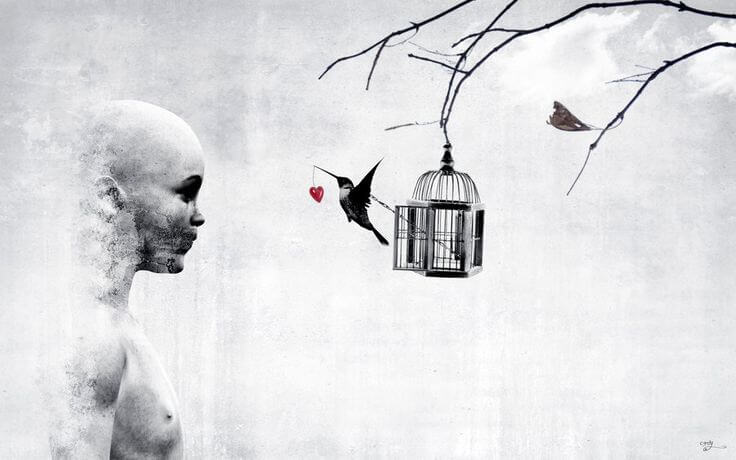Embittered People Sow Sadness in the Lives of Others

In many cases bitterness is often a form of concealed depression where the person focuses almost exclusively on the outside world. The world of embittered people is full of windows through which he sees only injustice, and where he likes to look out from in order to pour out his resentments, his bitterness and his pessimistic feelings. The embittered person wants captives, but he also cries out for help.
Surely many of us will now be thinking of people we know who, at times, give us the impression that they take pleasure in embittering our lives with their reasoning, advice and behavior. However, this supposed pleasure, that we infer from the frequency with which they do it, is not really pleasure at all – the truth is that they are not happy people.
Bitterness and resentment are anchors that always want to take captives, because their ships are stranded and drifting, and where there was once happiness there are now only unresolved sorrows.
Bitter people feel, above all, that they have lost control of their lives. They have such a defeatist attitude, that they simply stop being responsible for themselves. They assume the role of victim and are carried away. It is necessary then to know how to provide strategies to help them, because even though their behavior disturbs us, they are in great need of help.

The bitter person and the roots of bitterness
No one comes into the world with bitterness in their heart. Sometimes, however, childhood is a time when some begin to discover how this feeling develops and what it feels like. A childhood devoid of affection or communication can sow the seed at an early age, allowing the heart to form the roots that may develop into bitterness in the future.
Bitterness is a seed that is sown and does not usually germinate instantly. Its presence, at first, cannot be detected. One disappointment hurts, but it does not change us, two disappointments make us think, but when someone trips over too many “stones” along the way and lets them create negatively inside him, then the result is that he feels he has no control over his life. Then those seeds germinate … and a type of mental illness ensues.
One thing we should also take into account is the classic image of the “bitter old man”. We have all met those elderly people that react with apathy, that always looks at things from a negative point of view, and who seem to have so much resentment towards the world and life itself. As we read in the journal “Health Psychology“, these are, in most cases, indicators of an underlying depression. It is important to keep this in mind.

Bitterness and emotional numbness
Bitterness is often described as the classic “toxic” behavior. We are in the habit of labelling people as “toxic” very easily, and we often hide from them and move away quickly without considering the person and their emotional prison. This isn’t the right thing to do. At least not as far as bitterness is concerned.
The person who is not at peace with himself will be at war with everyone.
As we have already mentioned, people are not born bitter, it happens over time and as a result of different situations that haven’t been handled well, and which have become too much for the person in question. Don’t abandon them, don’t leave them to drift along in this emotional numbness. We know that a bitter and depressed brain can’t be changed overnight into a happy brain, but it’s always good to know some basic advice on the topic so that we may help.

How to change the attitude of an embittered person
As we have pointed out throughout the article, bitterness is sometimes an indicator of depression. Therefore, it is important to encourage the person to go to a health professional to assess their condition. This is a necessary and essential first step. Later, we can put the following into practice:
- Always act with compassion and optimism. We know that the bitter person wants to trap us with their cynicism, resentment and fatalism. However, rather than giving in, we shouldn’t ever alter our attitude and we should respond to their negativity with optimism.
- Do not personalize your attacks, be patient. It isn’t the heart of the person that is speaking, it is the root of their bitterness and their poorly handled disappointments, their traumas that haven’t been assimilated and their emptiness which no-one seems to understand. Keep calm and always respond with kindness and friendliness.
- Invite the bitter person to acquire new habits. Bitterness is passive, corrosive and nourished by the thoughts of the person. One way to “break” this cycle of negativity is to try to change the person’s habits, to adopt new habits, to go through other scenarios. So, without pressure, simply suggest that they go for walks, play sports, sign up for a course, meet new people …

The person who is not at peace with himself, his past and his thoughts, will be at war with all those that surround him. Let them find a balance, a key that will heal their wounds and give them peace for their inner battles. We need to help them, but at the same time know our own limits and not neglect our self-esteem.
In many cases bitterness is often a form of concealed depression where the person focuses almost exclusively on the outside world. The world of embittered people is full of windows through which he sees only injustice, and where he likes to look out from in order to pour out his resentments, his bitterness and his pessimistic feelings. The embittered person wants captives, but he also cries out for help.
Surely many of us will now be thinking of people we know who, at times, give us the impression that they take pleasure in embittering our lives with their reasoning, advice and behavior. However, this supposed pleasure, that we infer from the frequency with which they do it, is not really pleasure at all – the truth is that they are not happy people.
Bitterness and resentment are anchors that always want to take captives, because their ships are stranded and drifting, and where there was once happiness there are now only unresolved sorrows.
Bitter people feel, above all, that they have lost control of their lives. They have such a defeatist attitude, that they simply stop being responsible for themselves. They assume the role of victim and are carried away. It is necessary then to know how to provide strategies to help them, because even though their behavior disturbs us, they are in great need of help.

The bitter person and the roots of bitterness
No one comes into the world with bitterness in their heart. Sometimes, however, childhood is a time when some begin to discover how this feeling develops and what it feels like. A childhood devoid of affection or communication can sow the seed at an early age, allowing the heart to form the roots that may develop into bitterness in the future.
Bitterness is a seed that is sown and does not usually germinate instantly. Its presence, at first, cannot be detected. One disappointment hurts, but it does not change us, two disappointments make us think, but when someone trips over too many “stones” along the way and lets them create negatively inside him, then the result is that he feels he has no control over his life. Then those seeds germinate … and a type of mental illness ensues.
One thing we should also take into account is the classic image of the “bitter old man”. We have all met those elderly people that react with apathy, that always looks at things from a negative point of view, and who seem to have so much resentment towards the world and life itself. As we read in the journal “Health Psychology“, these are, in most cases, indicators of an underlying depression. It is important to keep this in mind.

Bitterness and emotional numbness
Bitterness is often described as the classic “toxic” behavior. We are in the habit of labelling people as “toxic” very easily, and we often hide from them and move away quickly without considering the person and their emotional prison. This isn’t the right thing to do. At least not as far as bitterness is concerned.
The person who is not at peace with himself will be at war with everyone.
As we have already mentioned, people are not born bitter, it happens over time and as a result of different situations that haven’t been handled well, and which have become too much for the person in question. Don’t abandon them, don’t leave them to drift along in this emotional numbness. We know that a bitter and depressed brain can’t be changed overnight into a happy brain, but it’s always good to know some basic advice on the topic so that we may help.

How to change the attitude of an embittered person
As we have pointed out throughout the article, bitterness is sometimes an indicator of depression. Therefore, it is important to encourage the person to go to a health professional to assess their condition. This is a necessary and essential first step. Later, we can put the following into practice:
- Always act with compassion and optimism. We know that the bitter person wants to trap us with their cynicism, resentment and fatalism. However, rather than giving in, we shouldn’t ever alter our attitude and we should respond to their negativity with optimism.
- Do not personalize your attacks, be patient. It isn’t the heart of the person that is speaking, it is the root of their bitterness and their poorly handled disappointments, their traumas that haven’t been assimilated and their emptiness which no-one seems to understand. Keep calm and always respond with kindness and friendliness.
- Invite the bitter person to acquire new habits. Bitterness is passive, corrosive and nourished by the thoughts of the person. One way to “break” this cycle of negativity is to try to change the person’s habits, to adopt new habits, to go through other scenarios. So, without pressure, simply suggest that they go for walks, play sports, sign up for a course, meet new people …

The person who is not at peace with himself, his past and his thoughts, will be at war with all those that surround him. Let them find a balance, a key that will heal their wounds and give them peace for their inner battles. We need to help them, but at the same time know our own limits and not neglect our self-esteem.
This text is provided for informational purposes only and does not replace consultation with a professional. If in doubt, consult your specialist.







